

Black Box Ride on Time [ 1989 ] HD version. Electronic dance music. Electronic dance music (also known as EDM, dance music,[1] club music,[2] or simply dance) is a broad range of percussive electronic music genres produced primarily for dance-based entertainment environments such as nightclubs, raves, and festivals.
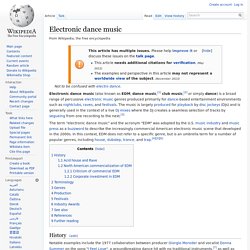
The music is largely produced for playback by disc jockeys (DJs) and is generally used in the context of a live DJ mixes where the DJ creates a seamless selection of tracks by segueing from one recording to the next.[3] The term "electronic dance music" and the acronym "EDM" was adopted by the U.S. music industry and music press as a buzzword to describe the increasingly commercial American electronic music scene that developed in the 2000s. In this context, EDM does not refer to a specific genre, but is an umbrella term for a number of popular genres, including house, dubstep, trance, and trap.[4][5][6] Detroit. Detroit /dɨˈtrɔɪt/[7] is the most populous city in the U.S. state of Michigan, and is also the seat of Wayne County, the most populous county in the state and the largest city on the United States-Canada border.
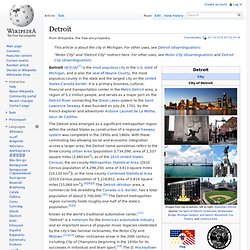
It is a primary business, cultural, financial and transportation center in the Metro Detroit area, a region of 5.2 million people, and serves as a major port on the Detroit River connecting the Great Lakes system to the Saint Lawrence Seaway. It was founded on July 24, 1701, by the French explorer and adventurer Antoine Laumet de La Mothe, sieur de Cadillac. House music. Influences and precursors[edit] Rachel Cain, co-founder of an influential Trax Records, was previously involved in the burgeoning punk scene and cites industrial (another Chicago originating music creation) and post-punk record store Wax Trax!

Records as an important connection between the ever-changing underground sounds of Chicago. As most proto-house DJs were primarily stuck to playing their conventional ensamble of dance records, Frankie Knuckles and Ron Hardy, two influential pioneers of house music, were known for their out-of-bounds behavior. House dance. Technological utopianism. In the late 20th and early 21st centuries, several ideologies and movements, such as the cyberdelic counterculture, the Californian Ideology, transhumanism,[1] and singularitarianism, have emerged promoting a form of techno-utopia as a reachable goal.
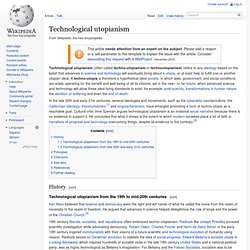
Cultural critic Imre Szeman argues technological utopianism is an irrational social narrative because there is no evidence to support it. He concludes that what it shows is the extent to which modern societies place a lot of faith in narratives of progress and technology overcoming things, despite all evidence to the contrary.[2] History[edit] Technological utopianism from the 19th to mid-20th centuries[edit] Age of Enlightenment. The Age of Enlightenment (or simply the Enlightenment, or Age of Reason) is an era from the 1650s to the 1780s in which cultural and intellectual forces in Western Europe emphasized reason, analysis and individualism rather than traditional lines of authority.

It was promoted by philosophes and local thinkers in urban coffeehouses, salons and masonic lodges. It challenged the authority of institutions that were deeply rooted in society, such as the Catholic Church; there was much talk of ways to reform society with toleration, science and skepticism. New ideas and beliefs spread around the continent and were fostered by an increase in literacy due to a departure from solely religious texts. Publications include Encyclopédie (1751–72) that was edited by Denis Diderot and (until 1759) Jean le Rond d'Alembert. Modernism. Hans Hofmann, "The Gate", 1959–1960, collection: Solomon R.
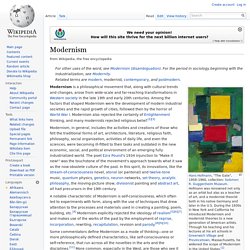
Guggenheim Museum. Gentrification. Gentrification is a shift in an urban community toward wealthier residents and/or businesses and increasing property values.[1] Gentrification is typically the result of investment in a community by local government, community activists, or business groups, and can often spur economic development, attract business, and lower crime rates.

In addition to these potential benefits, gentrification can lead to population migration, which involves poorer residents being displaced by wealthier newcomers. In a community undergoing gentrification, the average income increases and average family size decreases. Poorer pre-gentrification residents who are unable to pay increased rents or property taxes[dubious ] may be driven out. Often old industrial buildings are converted to residences and shops. Transhumanism. Transhumanism (abbreviated as H+ or h+) is an international cultural and intellectual movement with an eventual goal of fundamentally transforming the human condition by developing and making widely available technologies to greatly enhance human intellectual, physical, and psychological capacities.[1] Transhumanist thinkers study the potential benefits and dangers of emerging technologies that could overcome fundamental human limitations, as well as the ethics of developing and using such technologies.
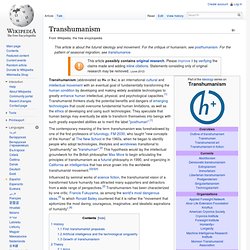
They speculate that human beings may eventually be able to transform themselves into beings with such greatly expanded abilities as to merit the label "posthuman".[1] Sociocultural evolution. Sociocultural evolution, sociocultural evolutionism or cultural evolution are umbrella terms for theories of cultural and social evolution that describe how cultures and societies change over time. Whereas sociocultural development traces processes that tend to increase the complexity of a society or culture, sociocultural evolution also considers process that can lead to decreases in complexity (degeneration) or that can produce variation or proliferation without any seemingly significant changes in complexity (cladogenesis).[1] Sociocultural evolution can be defined as "the process by which structural reorganization is affected through time, eventually producing a form or structure which is qualitatively different from the ancestral form.
" Most 19th-century and some 20th-century approaches to socioculture aimed to provide models for the evolution of humankind as a whole, arguing that different societies are at different stages of social development. Post-industrial society. Clark's Sector model for US economy 1850 -2009.[1] In sociology, the post-industrial society is the stage of society's development when the service sector generates more wealth than the manufacturing sector of the economy.
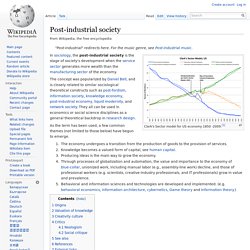
The concept was popularized by Daniel Bell, and is closely related to similar sociological theoretical constructs such as post-fordism, information society, knowledge economy, post-industrial economy, liquid modernity, and network society. They all can be used in economics or social science disciplines as a general theoretical backdrop in research design. As the term has been used, a few common themes (not limited to those below) have begun to emerge. Techno-progressivism. Stance[edit] Strong techno-progressive positions include support for the civil right of a person to either maintain or modify his or her own mind and body, on his or her own terms, through informed, consensual recourse to, or refusal of, available therapeutic or enabling biomedical technology.[3] Contrasting stance[edit] Bioconservatism (a portmanteau word combining "biology" and "conservatism") is a stance of hesitancy about technological development especially if it is perceived to threaten a given social order.
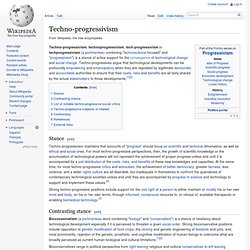
The Californian Ideology. Richard Barbrook (left) and Andy Cameron (right) "The Californian Ideology" is a critique of dotcom neoliberalism by English media theorists Richard Barbrook and Andy Cameron of the University of Westminster.[1] Barbrook and Cameron argue that the rise of networking technologies in Silicon Valley in the 1990s was linked to American neoliberalism and a paradoxical hybridization of beliefs from the political left and right in the form of hopeful technological determinism. Andrew Leonard of Salon.com called Barbrook & Cameron's work "one of the most penetrating critiques of neo-conservative digital hypesterism yet published.
Technological determinism. Technological determinism is a reductionist theory that presumes that a society's technology drives the development of its social structure and cultural values. The term is believed to have been coined by Thorstein Veblen (1857–1929), an American sociologist and economist. The most radical technological determinist in the United States in the 20th century was most likely Clarence Ayres who was a follower of Thorstein Veblen and John Dewey.
William Ogburn was also known for his radical technological determinism. Origin[edit] The term is believed to have been coined by Thorstein Veblen (1857–1929), an American social scientist.